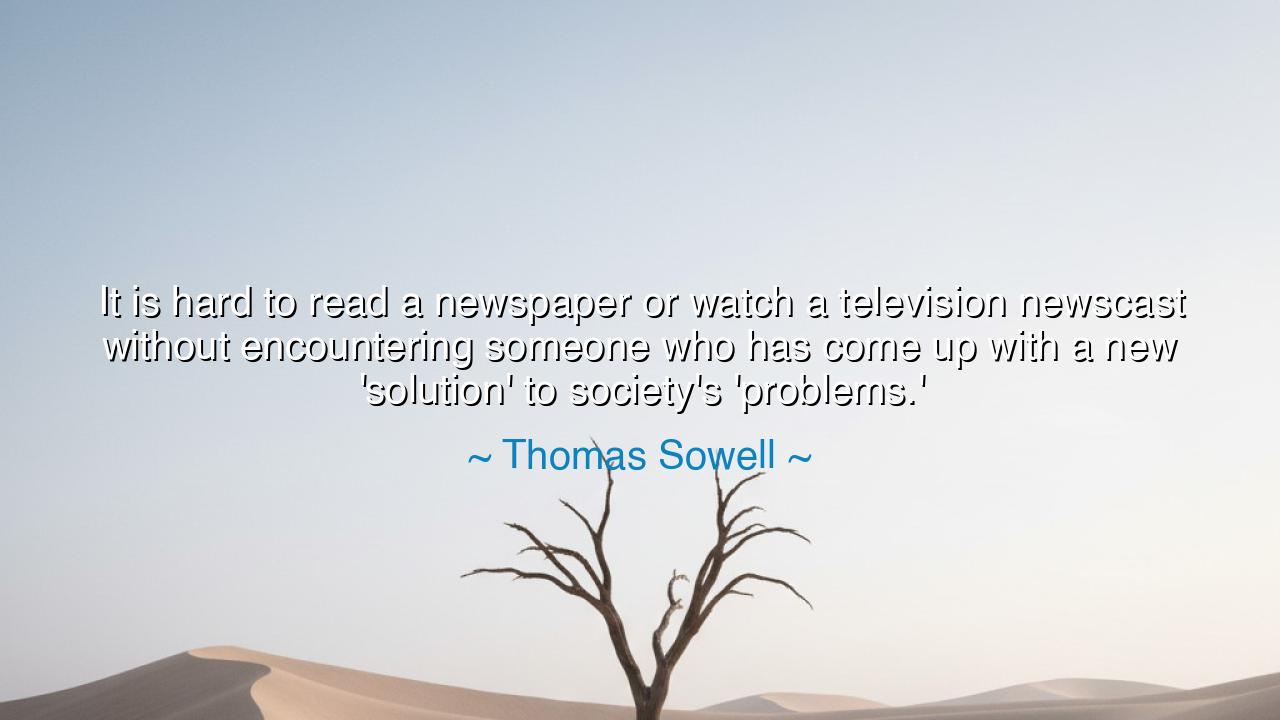
It is hard to read a newspaper or watch a television newscast
It is hard to read a newspaper or watch a television newscast without encountering someone who has come up with a new 'solution' to society's 'problems.'






The thinker and economist Thomas Sowell, in his clarity of vision, once said: “It is hard to read a newspaper or watch a television newscast without encountering someone who has come up with a new ‘solution’ to society’s ‘problems.’” At first glance, these words may seem merely skeptical, but when heard deeply, they ring like a warning bell. For Sowell is not mocking human concern but reminding us of the danger that lies in quick remedies and shallow answers. The problems of society are vast, ancient, and complex. To promise a cure with ease is often to deceive, whether through ignorance or ambition.
The phrase new solution in Sowell’s mouth carries the weight of irony. For every generation has seen leaders, scholars, and agitators rise with silver-tongued promises: “Follow me, and I will fix all that is broken.” Yet too often, these solutions—born in haste, shaped in vanity—only deepen the very wounds they claim to heal. His words are a call to wisdom: that one must not mistake slogans for truth, nor confuse lofty speeches with lasting remedies.
History shows this pattern with painful clarity. Consider the experiment of Prohibition in the United States during the 1920s. Legislators proclaimed it the grand solution to society’s drunkenness, crime, and disorder. They outlawed alcohol, declaring that virtue would follow by law’s decree. Yet instead of healing, the nation saw corruption, bootlegging, and the rise of organized crime. The “solution” became a deeper problem, proving Sowell’s point that society’s ailments cannot be cured with sweeping gestures divorced from reality.
So too in other lands we find examples. Mao Zedong’s Great Leap Forward was hailed as a magnificent solution to poverty and backwardness. Promises of abundance and equality filled the air, but the reality was famine, suffering, and the death of millions. Here the pattern is clear: when men propose radical “solutions” without humility, without respect for complexity, they unleash destruction upon those they claim to save. Sowell’s observation is not cynicism—it is a recognition that human folly, cloaked in noble rhetoric, often harms more than it heals.
The meaning of his words is therefore both practical and eternal: that true solutions are rare, and that wisdom requires humility before the tangled web of human life. Society’s problems are not puzzles to be solved with a single move, but conditions to be managed with patience, prudence, and respect for human nature. The danger lies not in caring for these problems, but in pretending they can be wiped away by decree. Sowell calls us to be watchful, to discern between shallow promises and genuine reform.
The lesson for us is sobering: when you hear a new proposal shouted from the pulpits of politics or media, do not be swept away by its promise. Ask yourself—does this “solution” respect reality? Does it take into account human weakness, history, and the lessons of past failures? Or does it simply flatter our hopes while ignoring the cost? A wise people will not chase every new solution like children chasing bubbles in the wind. They will seek steady, thoughtful measures that honor both freedom and responsibility.
Practical wisdom flows: in your own life, beware of easy answers. When faced with complex challenges, resist the urge to accept the first solution offered, no matter how pleasing it sounds. Seek instead the slow, often difficult path of careful thought, tested truth, and small but real progress. Support leaders and teachers who do not offer miracles, but who labor with humility, aware of the limits of human wisdom.
So let Sowell’s words echo like a steady drumbeat: “It is hard to read a newspaper or watch a television newscast without encountering someone who has come up with a new ‘solution’ to society’s ‘problems.’” Take them as both caution and guidance. The world will always be filled with voices offering easy cures, but the wise will learn to distinguish noise from truth, illusion from wisdom. And in that discernment lies the path to a healthier, steadier society.






AAdministratorAdministrator
Welcome, honored guests. Please leave a comment, we will respond soon